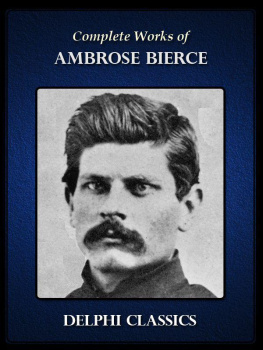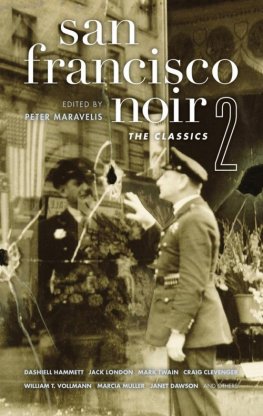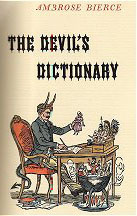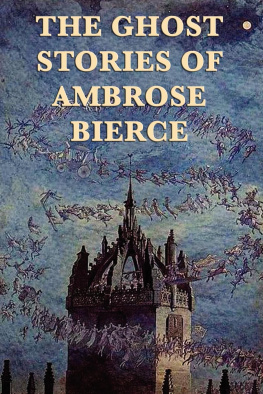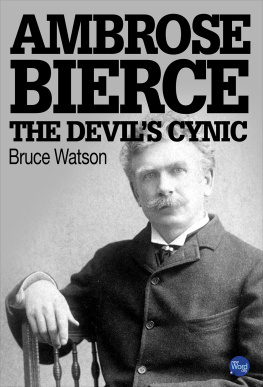Ambrose Bierce - Shapes of Clay
Here you can read online Ambrose Bierce - Shapes of Clay full text of the book (entire story) in english for free. Download pdf and epub, get meaning, cover and reviews about this ebook. genre: Art. Description of the work, (preface) as well as reviews are available. Best literature library LitArk.com created for fans of good reading and offers a wide selection of genres:
Romance novel
Science fiction
Adventure
Detective
Science
History
Home and family
Prose
Art
Politics
Computer
Non-fiction
Religion
Business
Children
Humor
Choose a favorite category and find really read worthwhile books. Enjoy immersion in the world of imagination, feel the emotions of the characters or learn something new for yourself, make an fascinating discovery.

- Book:Shapes of Clay
- Author:
- Genre:
- Rating:5 / 5
- Favourites:Add to favourites
- Your mark:
- 100
- 1
- 2
- 3
- 4
- 5
Shapes of Clay: summary, description and annotation
We offer to read an annotation, description, summary or preface (depends on what the author of the book "Shapes of Clay" wrote himself). If you haven't found the necessary information about the book — write in the comments, we will try to find it.
Shapes of Clay — read online for free the complete book (whole text) full work
Below is the text of the book, divided by pages. System saving the place of the last page read, allows you to conveniently read the book "Shapes of Clay" online for free, without having to search again every time where you left off. Put a bookmark, and you can go to the page where you finished reading at any time.
Font size:
Interval:
Bookmark:
SHAPES OF CLAY
BY
AMBROSE BIERCE
DEDICATION.
WITH PRIDE IN THEIR WORK, FAITH IN THEIR FUTURE AND AFFECTION FOR THEMSELVES, AN OLD WRITER DEDICATES THIS BOOK TO HIS YOUNG FRIENDS AND PUPILS, GEORGE STERLING AND HERMAN SCHEFFAUER. A.B.
PREFACE.
Some small part of this book being personally censorious, and in that part the names of real persons being used without their assent, it seems fit that a few words be said of the matter in sober prose. What it seems well to say I have already said with sufficient clarity in the preface of another book, somewhat allied to this by that feature of its character. I quote from "Black Beetles in Amber:"
"Many of the verses in this book are republished, with considerable alterations, from various newspapers. Of my motives in writing and in now republishing I do not care to make either defence or explanation, except with reference to those who since my first censure of them have passed away. To one having only a reader's interest in the matter it may easily seem that the verses relating to those might properly have been omitted from this collection. But if these pieces, or indeed, if any considerable part of my work in literature, have the intrinsic worth which by this attempt to preserve some of it I have assumed, their permanent suppression is impossible, and it is only a question of when and by whom they will be republished. Some one will surely search them out and put them in circulation.
"I conceive it the right of an author to have his fugitive work collected in his lifetime; and this seems to me especially true of one whose work, necessarily engendering animosities, is peculiarly exposed to challenge as unjust. That is a charge that can best be examined before time has effaced the evidence. For the death of a man of whom I have written what I may venture to think worthy to live I am no way responsible; and however sincerely I may regret it, I can hardly consent that it shall affect my literary fortunes. If the satirist who does not accept the remarkable doctrine that, while condemning the sin he should spare the sinner, were bound to let the life of his work be coterminous with that of his subject his were a lot of peculiar hardship.
"Persuaded of the validity of all this I have not hesitated to reprint even certain 'epitaphs' which, once of the living, are now of the dead, as all the others must eventually be. The objection inheres in all forms of applied satiremy understanding of whose laws and liberties is at least derived from reverent study of the masters. That in respect of matters herein mentioned I have but followed their practice can be shown by abundant instance and example."
In arranging these verses for publication I have thought it needless to classify them according to character, as "Serious," "Comic," "Sentimental," "Satirical," and so forth. I do the reader the honor to think that he will readily discern the nature of what he is reading; and I entertain the hope that his mood will accommodate itself without disappointment to that of his author.
AMBROSE BIERCE.
THE PASSING SHOW.
I.
I know not if it was a dream. I viewed
A city where the restless multitude,
Between the eastern and the western deep
Had roared gigantic fabrics, strong and rude.
Colossal palaces crowned every height;
Towers from valleys climbed into the light;
O'er dwellings at their feet, great golden domes
Hung in the blue, barbarically bright.
But now, new-glimmering to-east, the day
Touched the black masses with a grace of gray,
Dim spires of temples to the nation's God
Studding high spaces of the wide survey.
Well did the roofs their solemn secret keep
Of life and death stayed by the truce of sleep,
Yet whispered of an hour-when sleepers wake,
The fool to hope afresh, the wise to weep.
The gardens greened upon the builded hills
Above the tethered thunders of the mills
With sleeping wheels unstirred to service yet
By the tamed torrents and the quickened rills.
A hewn acclivity, reprieved a space,
Looked on the builder's blocks about his base
And bared his wounded breast in sign to say:
"Strike! 't is my destiny to lodge your race.
"'T was but a breath ago the mammoth browsed
Upon my slopes, and in my caves I housed
Your shaggy fathers in their nakedness,
While on their foeman's offal they caroused."
Ships from afar afforested the bay.
Within their huge and chambered bodies lay
The wealth of continents; and merrily sailed
The hardy argosies to far Cathay.
Beside the city of the living spread
Strange fellowship!the city of the dead;
And much I wondered what its humble folk,
To see how bravely they were housed, had said.
Noting how firm their habitations stood,
Broad-based and free of perishable wood
How deep in granite and how high in brass
The names were wrought of eminent and good,
I said: "When gold or power is their aim,
The smile of beauty or the wage of shame,
Men dwell in cities; to this place they fare
When they would conquer an abiding fame."
From the red East the suna solemn rite
Crowned with a flame the cross upon a height
Above the dead; and then with all his strength
Struck the great city all aroar with light!
II.
I know not if it was a dream. I came
Unto a land where something seemed the same
That I had known as 't were but yesterday,
But what it was I could not rightly name.
It was a strange and melancholy land.
Silent and desolate. On either hand
Lay waters of a sea that seemed as dead,
And dead above it seemed the hills to stand,
Grayed all with age, those lonely hillsah me,
How worn and weary they appeared to be!
Between their feet long dusty fissures clove
The plain in aimless windings to the sea.
One hill there was which, parted from the rest,
Stood where the eastern water curved a-west.
Silent and passionless it stood. I thought
I saw a scar upon its giant breast.
The sun with sullen and portentous gleam
Hung like a menace on the sea's extreme;
Nor the dead waters, nor the far, bleak bars
Of cloud were conscious of his failing beam.
It was a dismal and a dreadful sight,
That desert in its cold, uncanny light;
No soul but I alone to mark the fear
And imminence of everlasting night!
All presages and prophecies of doom
Glimmered and babbled in the ghastly gloom,
And in the midst of that accursd scene
A wolf sat howling on a broken tomb.
ELIXER VITAE.
Of life's elixir I had writ, when sleep
(Pray Heaven it spared him who the writing read!)
Sealed upon my senses with so deep
A stupefaction that men thought me dead.
The centuries stole by with noiseless tread,
Like spectres in the twilight of my dream;
I saw mankind in dim procession sweep
Through life, oblivion at each extreme.
Meanwhile my beard, like Barbarossa's growing,
Loaded my lap and o'er my knees was flowing.
The generations came with dance and song,
And each observed me curiously there.
Some asked: "Who was he?" Others in the throng
Replied: "A wicked monk who slept at prayer."
Some said I was a saint, and some a bear
These all were women. So the young and gay,
Visibly wrinkling as they fared along,
Doddered at last on failing limbs away;
Font size:
Interval:
Bookmark:
Similar books «Shapes of Clay»
Look at similar books to Shapes of Clay. We have selected literature similar in name and meaning in the hope of providing readers with more options to find new, interesting, not yet read works.
Discussion, reviews of the book Shapes of Clay and just readers' own opinions. Leave your comments, write what you think about the work, its meaning or the main characters. Specify what exactly you liked and what you didn't like, and why you think so.


